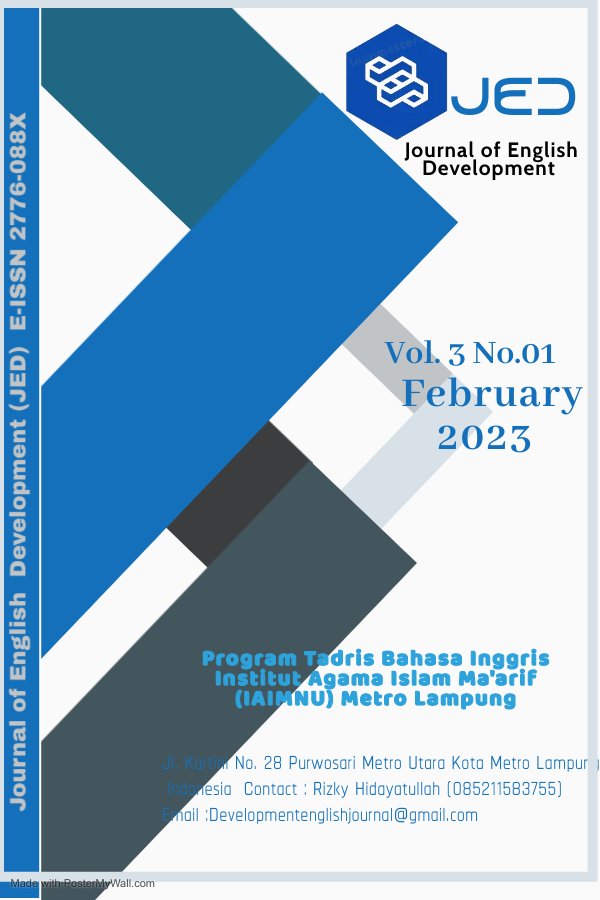EFL LEARNERS’ PERCEPTION TOWARDS THE IMPLEMENTATION OF DICTOCOMP IN ENGLISH WRITING CLASSROOM
English
DOI:
https://doi.org/10.25217/jed.v3i01.3730Keywords:
Keywords: Perception, dictocomp, writingAbstract
This research aimed at seeing whether or not the EFL learners had positive perception towards teaching English writing with dictocomp. An experimental research design which mainly concerned on the descriptive analysis was used. Eighteen students were selected purposively as the research sample. A close-ended questionnaire with 15 question items was used as a main instrument to see their feedback. The research findings revealed that the EFL learners’ learning motivation and confidence were exceedingly boosted. In addition, their English writing difficulties were slightly solved. Furthermore, their English writing performance had positive and significant development after being instructed with dictocomp. Another positive response was about the English writings aspects of the EFL learners were also well-improved. Thus, in concluding, the EFL learners had positive perception towards the implementation of dictocomp in English writing classroom.
References
Abas, I. H., & Aziz, N. H. A. (2016). Indonesian EFL students’ perspective on writing process: A pilot study. Advances in Language and Literary Studies, 7(3), 221-27.
Angraini, N., & Iman, J. (2022). Dicto-Comp in Indonesian’ English Writing Class. Jo-ELT (Journal of English Language Teaching) Fakultas Pendidikan Bahasa & Seni Prodi Pendidikan Bahasa Inggris IKIP, 9(2), 172-184. doi:https://doi.org/10.33394/jo-elt.v9i2.6332
Amiati, D. R. (2020). Developing writing skill of grade eighth students at Smp Otak Kanan Palu through dicto-comp technique. Journal of Foreign Language and Educational Research, 2(2), 1-9. https://doi.org/10.31934/jofler.v2i2.1348
Abbasian, G. R., & Mohammadi, M. (2013). The effectiveness of dictogloss in developing general writing skill of Iranian intermediate EFL learners. Journal of Language Teaching & Research, 4(6), 1371-1380.
Abrar, M., Mukminin, A., Habibi, A., Asyrafi, F., Makmur, M., & Marzulina, L. (2018). “If our English isn’t a language, what is it?” Indonesian EFL student teachers’ challenges speaking English. The Qualitative Report, 23(1), 129-145.
Davis, P., & Rinvolucri, M. (1995). Dictation: New methods new possibilities. Australia: Cambridge University Press.
Isa, Q. N. M., Risdaneva, R., & Alfayed, A. (2017). An analysis of Acehnese EFL students’ grammatical errors in writing recount texts. Englisia: Journal of Language, Education, and Humanities, 5(1), 41-50.
Kustati, M., & Yuhardi. (2014). The Effect of the Peer-Review Technique on Students’ Writing Ability, Studies in English Language and Education, 1(2), 71-81.
MacKenzie, A. (2012). Using content and language integrated learning for business administration students. Retrieved from http://www.toyo.ac.jp/uploaded/attachment/6892.pdf
Muttakiah, K. (2016). Assessing Recount Text Writing Ability Through Dicto-Comp of the Twelfth-Grade Students of SMK Kharism Mengwi in Academic Year 2015/2016. Universitas Mahasaraswati Denpasar.
Nation, I. S. P., & Newton, J. (2009). Teaching ESL/EFL listening and speaking. New York, NY: Routledge.
Oppenheimer, D., Zaromb, F., Pomerantz, J. R., Williams, J. C., & Park, Y. S. (2017). Improvement of writing skills during college: A multi-year cross-sectional and longitudinal study of undergraduate writing performance. Assessing Writing, 32, 12–27. doi:10.1016/j.asw.2016.11.001
Phonna, R. (2014). An analysis of students’ free writing. Englisia: Journal of Language, Education, and Humanities, 1(2).
Rosdiana, R (2020). Dicto-comp:A technqiue in reducing high school students’ errors in writing. Accentia: Journal of English Language and Education, 1(2), 99-105
Salima, R. (2012). Measures of eliminating EFL students’ errors in writing. Procedia – Social and Behavioural Sciences, 69, 318-327.
Singh, M., & Aziz, A. A. (2020). The Use of Dictocomp Technique to Improve Text Structure in Writing of Recounts among Year 4 Intermediate Proficiency Pupils. International Journal of Academic Research in Business and Social Science, 10(6), 586–594.
Suadah, L. (2014). Enhancing EFL learners’ writing skills through blogging. Englisia: Journal of Language, Education, and Humanities, 2(1), 20-29.
Sutarman., Sunendar, D., & Mulyati, Y. (2019). Investigating Cooperative Learning Model Based on Interpersonal Intelligence on Language Learners Skill to Write Article. International Journal of Instruction, 12(4), 201-218.
Timayi, C., Jibir-Daura., R. & Mohammed, S. (2016). Remediating Nigerian junior secondary school students written English ability and writing anxiety using the guided writing strategy, Journal of Language and Communication, 3(2), 207-217
Wardani, N. R., & Sari, Y. I. (2017). Pengaruh Model Group Investigation Terhadap Kemampuan Menulis Artikel Mahasiswa [The Influence of Group Investigation Model on Students’ Ability to Write Articles]. Jurnal Pendidikan dan Ilmu Geografi, 2(1), 160-166.
Widiastuti, N. P. S., Sukamerta, I. M., & Arsana, A. A. P. (2020). Assessing descriptive paragraph writing ability of the eighth grade students of SMPN 2 Denpasar through dicto-comp. Journal on Studies in English Language Teaching (JOSELT), 1(1), 41-48.

Downloads
Published
How to Cite
Issue
Section
License
Copyright (c) 2023 Jaya Nur Iman, Nike Angraini, Desi Surayatika

This work is licensed under a Creative Commons Attribution-ShareAlike 4.0 International License.





